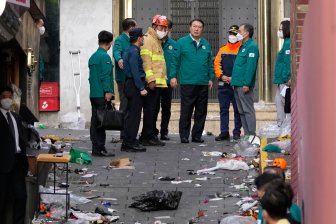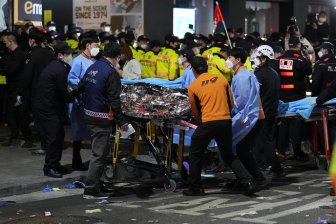A psychiatrist involved in efforts to support children of Canadian women detained in Syria after traveling to join Islamic State is urging Ottawa to speed up repatriation efforts.
dr Cecile Rousseau, a child psychiatrist at McGill University and an expert on violent radicalization and extremism, was part of a committee of local health officials and child protection experts brought together by the Quebec RCMP branch after the fall of the caliphate in 2017.
She said she doesn’t think a handful of women returning with young children who are being monitored and supported will pose a danger to Canadian society.
CONTINUE READING: Canada’s policy of secrecy towards ISIS detainees is closing the door on repatriation
“I think we should move forward because the longer we wait, the harder it will be for Canada and for the people who are going back to reintegrate into society,” Rousseau said.
The story continues below the ad
“So waiting is not a good idea, especially with young children. They are Canadian citizens, let’s take them home – that’s the best outcome for them and for us.”
On Wednesday, 27-year-old Oumaima Chouay returned to Canada with her two children and another Canadian adult, Kimberly Polman from BC
Chouay is accused of leaving Canada to engage in terrorist group activities, engaging in terrorist group activities, providing property or services for terrorist purposes and engaging in terrorist group activities. Her case returns to court on November 8.

1:04
Canadian intelligence agencies bound by ‘strict rules’: Trudeau
Polman was released on bail by a British Columbia court on Thursday pending a peace bond hearing.
Rousseau said in an interview on Thursday that she could not speak about Chouay’s children, but she had discussed the reintegration efforts being considered prior to her arrival from northeastern Syria, particularly from the child’s perspective.
The story continues below the ad
Quebec authorities are awaiting the return of citizens who traveled to the Middle East to join Islamic State, with particular concern for young children born abroad who are arriving in Canada for the first time.
They spent more than a year discussing the plight of these children and their mothers being held in detention camps and developing a plan for them.
hot right now
-

South Korea declares national mourning after Halloween rush
-

South Korea is in shock after a Halloween rush killed at least 150 people
CONTINUE READING: Canadian was a “productive propagandist” in IS, US prosecutors say
Rousseau said officials looked at experiences in England and France, where mothers were automatically separated from their children after their repatriation. They also examined other models that involve a collaborative approach that favors no separation between mother and children and rapid integration into school and community.
“The idea was to encourage the maintenance of a bonded relationship as much as possible,” she said. “If possible with a parent, definitely with a relative and the extended family as long as the children are safe. And not the predicament of other European countries that somehow felt that extended families should be considered suspect until proven otherwise.”
Authorities hope to avoid a placement revolving door, particularly “for children who have experienced cumulative trauma, multiple attachment disorders, and have lived in emergency or survival situations for the past three years, if not their entire lives,” he said Rousseau.
The story continues below the ad

1:50
IS leader killed in US special forces raid in Syria
During a press conference on Wednesday, the Quebec RCMP said the force had long-standing concerns about the children. Insp. David Beaudoin said extensive measures have been put in place to ensure they receive adequate support, including extended family involvement.
Rousseau said authorities considered everything from their arrival at the airport to providing children who wait for hours while their parents are being interrogated with food, toys and a place to rest. They also discussed what to do when there is no extended family in Canada, finding safe foster environments while promoting cultural and religious continuity and security.
Rousseau said the first task was to determine whether the returning mothers were available to the children, both psychologically and emotionally. A depressed and traumatized mother may be able to care for the children but not necessarily provide emotional care, she said.
“Because we know it makes kids feel safe, and it’s absolutely necessary,” Rousseau said.
The story continues below the ad

2:09
Question to Feds as US authorities arrest Canadian ISIS fighter
Rousseau said that most children who come to Canada are toddlers or school-age children who have experienced trauma, war, or grief over the loss of a loved one, especially their father. Many of them will be suffering from acute post-traumatic stress disorder, but also complex post-traumatic stress, where patients are struggling with deprivation at the same time as traumatic symptoms, she added.
Prime Minister Justin Trudeau was asked about repatriation efforts last week and stressed it was important that people who traveled to support terrorism face consequences.
“Basically, traveling in Canada for the purpose of supporting terrorism is a crime. And anyone who has traveled in support of terrorism should be prosecuted,” he said.
When asked if other repatriation efforts were underway, Trudeau said Canadian authorities would remain engaged in the region “responsibly”.
The story continues below the ad
This report from The Canadian Press was first published on October 30, 2022.
© 2022 The Canadian Press















